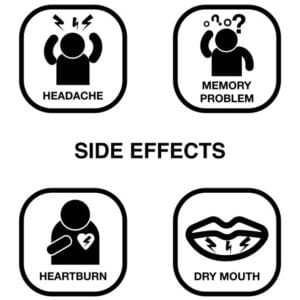Cognitive Evolution and Modafinil: A New Frontier or an Overrated Myth?
Over the past decade, the conversation around cognitive enhancement has shifted from fringe speculation to mainstream curiosity. Tech founders praise mental optimization, students hunt for sharper focus, and professionals seek anything that extends their mental endurance. At the center of this growing fascination stands Modafinil, a wakefulness-promoting drug originally designed to treat narcolepsy. For many, it symbolizes the idea of cognitive evolution — a step beyond ordinary human limits.
But recent scientific updates reveal a far more nuanced story. Behind the hype lies a complex reality: Modafinil helps some brains dramatically, has no effect on others, and may even hinder performance in healthy individuals. Two recent reports shed new light on this paradox, offering a clearer understanding of what Modafinil can — and cannot — do.
1. Long COVID and the Search for Cognitive Recovery
One of the most relevant news pieces of the past month centers on Long COVID and its persistent symptom known as brain fog. According to a scientific review from News-Medical, brain fog stems from three major neurological disruptions:
“Long COVID brain fog may stem from neuroinflammation, reduced cerebral blood flow, and disruptions in neural communication.”
These findings are critical for understanding Modafinil’s potential role. As researchers explore treatments that could restore cognitive clarity in affected patients, Modafinil appears on the list of drugs under consideration.
The reasoning is straightforward:
- Modafinil increases wakefulness
- It enhances attentional control in individuals experiencing fatigue
- It may support neural network efficiency when natural alertness is compromised
But it is equally important to emphasize what the report does not claim. The emerging data do not present Modafinil as a miracle drug that elevates the human mind beyond normal capacity. Instead, it is being evaluated as a restorative tool, something that may help return impaired cognition to its baseline.
For people suffering from post-viral cognitive dysfunction, this is meaningful. But it also sets clear boundaries: Modafinil’s strongest effects appear where the brain is dysfunctional, not where it is already healthy.
2. The Controversy: Does Modafinil Actually Improve a Healthy Mind?
A deeper complication appears when examining research on cognitive enhancers in people without ADHD or neurological deficits. Neuroscience News highlights a compelling discovery:
“Cognitive enhancers may actually diminish performance in people without ADHD.”
This challenges the popular belief that Modafinil is a universal booster. Why would a drug known for improving wakefulness reduce cognitive efficiency in some users?
According to researchers, the explanation lies in the difference between restorative enhancement and artificial overstimulation.
To put it simply:
- A tired brain benefits from increased alertness
- A dysfunctional brain benefits from assisted network communication
- But a well-tuned, healthy brain can become overloaded when pushed beyond its natural balance
Modafinil influences neurotransmitter systems — including dopamine, norepinephrine, and histamine — that regulate attention and cognitive energy. When these systems are already functioning optimally, external stimulation may disrupt rather than enhance them.
This is why some healthy individuals report:
- increased focus but reduced creativity
- better sustained attention but poorer flexible thinking
- heightened alertness but weaker emotional processing
The narrative of “smart drugs” becomes much less glamorous under the scrutiny of real data.
3. Cognitive Evolution: Where Science Meets Imagination
The concept of cognitive evolution goes far beyond clinical treatment. It represents the dream that humans might one day unlock radically accelerated thinking — instant recall, faster decision-making, enhanced perception, and near-limitless mental endurance.
Modafinil often gets wrapped into this fantasy because of stories from Silicon Valley, student communities, and high-pressure work environments. But the latest news and scientific insights paint a different picture:
- Modafinil is not a catalyst for superhuman intelligence.
- It does not permanently upgrade neural capacity.
- It does not rewire the brain into a new evolutionary form.
What it does — consistently and reliably — is reduce cognitive deficits caused by fatigue, illness, or sleep disorders. This alone is valuable and transformative for those who need it. But it is not the dawn of a new mental species.
Real cognitive evolution will likely come from a combination of:
- neurotechnology
- genetic research
- advanced AI integration
- non-pharmacological brain stimulation
- pharmaceutics more targeted than today’s enhancers
Modafinil, despite its cultural legendary status, is only a stepping stone in a much larger scientific journey.
4. Why Modafinil Remains Relevant
Even with its limitations, Modafinil retains major importance in the research landscape for three reasons:
1. Predictable effects under cognitive strain
When the brain is exhausted, overstressed, or impaired, Modafinil often restores clarity and functional control.
2. Safety profile
Compared to amphetamine-based stimulants, Modafinil generally has fewer side effects and significantly lower addiction potential.
3. Strategic use in medicine
It may hold promise for helping people with:
- Long COVID brain fog
- Chronic fatigue
- Severe sleep disorders
- Post-illness cognitive dysfunction
Researchers continue exploring how to fine-tune its application, but the dominant direction is therapeutic — not evolutionary.
5. So, What Is the Truth About Modafinil?
Based on the most recent evidence:
- Modafinil is not a universal cognitive enhancer
- It helps impaired cognition, but
- It may harm performance in perfectly healthy individuals
- It is not a tool of cognitive evolution, but
- It remains one of the safest and most effective restorative enhancers we currently have
The myth of becoming a “superhuman thinker” through Modafinil is attractive, but misleading. The emerging data bring us back to grounded reality: the drug supports the brain when it struggles — not when it thrives.
In other words, Modafinil is not about surpassing human limits.
It’s about recovering the limits we already possess.
And sometimes, that difference is what defines progress.




